Welcome to The Reading Nook, a space where I share my reading journey and talk about books and bookish stuff. If you’re not interested in The Reading Nook, you can specifically toggle off these emails in your account settings.
Today, I write about reading slumps and a possible solution to them, attempting to become a poetry reader for the umpteenth time, my love for Nigerian boarding school scary stories, and more. I hope you enjoy this edition.
Side note: I read other things aside from books—essays, newsletters, short fiction, etc. As this is ‘The Reading Nook’, I’m thinking of ways I can incorporate them, specifically the ones I feel the urge to share, into the newsletter. So, there might be a bit of experimenting before I figure out what works. I hope something I share resonates with someone out there.
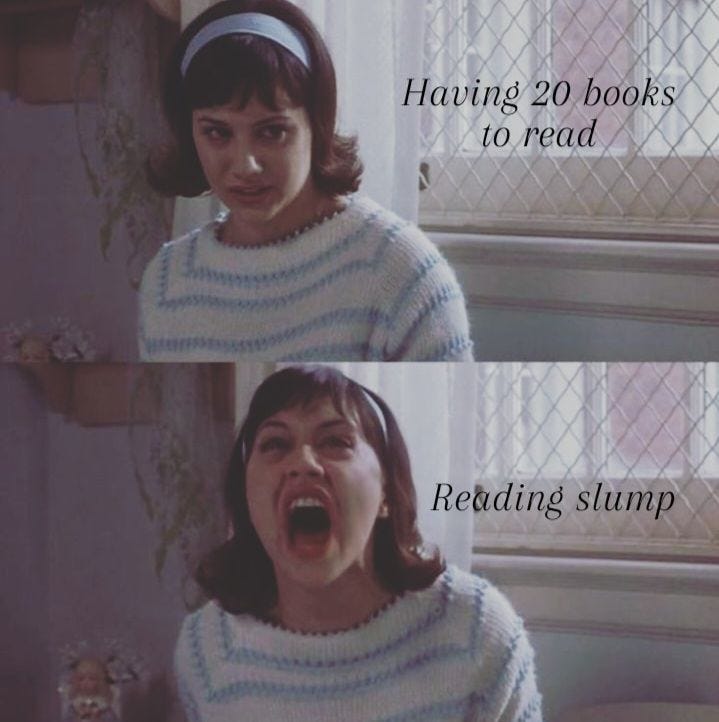
What kind of reading month was it?
It’s been a terrible reading month for me. After completing a book on the 2nd of October, basically, for the rest of the month, I was writhing in a deep reading slump. Although the idea of reading a book and diving headfirst into a fictional world appealed to me, I felt unmotivated and lacked the desire to pick up a book. I chose instead to rewatch the (original) Charmed series multiple times. Then, when I attempted to read, I either got a few chapters in before giving up, or I couldn’t even make it past the first paragraph. I started and stopped about four books this month, and I don’t think it was the books that were the problem.
I trudged my way through an audiobook for almost two weeks, and after finishing it, I was unable to read any other thing. Then, a couple of days back, for the second time in a row, an Efua Traoré book came to my rescue, and I practically finished it in a day (hopefully!), breaking the reading slump curse.
A probable solution to reading slumps
How do you deal with reading slumps? The two antidotes I’m aware of to battle this ordeal are either waiting it out and exploring other interests or trying to find the one book that will break the spell. But how do you know which medication to administer? How do you know when to fight or when to accept it? And what if there was a reading slump doctor? I think that would be really helpful. They’d want to know your symptoms.
Did anything awful or sad happen to you recently? Do you feel like reading at all, or is the desire absent? What kind of book are you looking to read at the moment? What type of story would excite you? And then they find the perfect recommendation. This should be an app or something.
October Reading Journey
For a couple of years, I’ve tried earnestly reading poetry, searching for the awe and joy that poetry readers seem to find in it. I’ve read a couple of collections, but I know I didn’t read them well. Poetry is not meant to be rushed but savoured. It’s meant to be slowly combed through and appreciated for the way it feels on the tongue. But I always sped through poems.
Recently, I decided to start small by focusing on a single poem. I went on Poetry Foundation and found the poem, The Applicant, by Sylvia Plath. It had a poem guide, so that encouraged me to read it.
I read it silently and then out loud. As I read it again and again, I was amazed by how much clearer it became and how I found meaning in a group of words I didn’t understand the first time I read them. (Of course, the poem guide helped tremendously).
Slyvia Plath wrote the poem the day her husband abandoned her and her children. It’s a figurative depiction of how she views the arrangement and dealings of marriage. An ‘applicant’ goes searching for a wife in a sort of shop which sells them, and we are an audience to the salesperson interviewing and trying to sell this man—the applicant—a wife. From the way the salesperson describes the potential wife, we can decipher Plath’s thoughts on how women are viewed in marriage.
‘It can sew, it can cook
It can talk, talk, talk.
It works, there is nothing wrong with it.’ (lines 34-36)
I find the poem intriguing and enjoyed the process of getting to this point. I’m excited by what else awaits me in my journey of poetry reading.
Behind the gorgeous cover, Others Were Emeralds is a poignant story set in Australia in the late 90s. It follows 17-year-old Ai, a daughter of Cambodian refugees who fled the Khmer Rouge, and her friends who live in Whitlam, a fictional town that’s primarily home to Asian immigrants.
The story starts with Ai’s budding relationship with Bowie. Brigitte, Ai’s best friend, is very supportive of the relationship despite shortly dating Bowie when she first arrived in town and before she and Ai became friends. Soon, one of their friends sows seeds of doubt in Ai, and she becomes dangerously suspicious of Brigitte’s motives. A chasm is formed between the best friends. Then, a tragic life-changing event occurs, and the book takes a turn. In the aftermath of the event, and for the rest of the book, Ai deals with trauma and grief and tries to settle into her life in uni.
An important element of this story is that it was set against a political backdrop of the experience of Asian immigrants—the racism, stereotyping and the role the media played in aggravating it. We see how it directly impacts the story as a whole and the lives of Ai, her friends, and her family, who all aren’t strangers to political turmoil, as stories about war and fleeing war are rampant in their conversations.
I loved this book. The writing was beautiful and reflective—sometimes to the point where I thought it was unrealistic because teenagers don’t talk that poetically or think that deeply. At first, I thought it would simply be a book about the chaos of a friendship group. It seemed that way at first, and the conflict in the first half of the book was captivating. But then the tragic event threw all the juvenile drama out the window.
Throughout the book, the reader is a close audience to Ai’s thought process. We see how her mind worked, what went through her head as she made certain choices, and we can understand her insecurities. I was also intrigued by Ai’s love for crafts and creating art with varied textures, and I liked when the author detailed her processes.
The book explores friendship, grief, immigration, racism, and ‘adulting’ in a way I found really interesting.
A quote from the book:
‘Everything could change in an instant, no matter who you were or how much you had. That luck or misfortune could strike at any given moment with the same cold indifference.’
I’ve heard about this book a lot but never read it. I listened to the audiobook narrated by Noah Galvin.
Set in the early 1990s, the book is written in the form of letters by Charlie, the protagonist, to an unknown recipient who remains anonymous till the end. Charlie is about to start high school, and he voices his fears in his letters and tells the receiver about how his only friend died of suicide.
Through these letters, we see Charlie go on a journey to belonging, participating in life and dealing with his trauma. We also see all the people who were present and instrumental in this journey, including Sam and Patrick, Charlie’s new friends who accept him into their clique and introduce new ways of living to him, Mr Anderson, his English teacher who gives Charlie lots of books to read outside class, and his family.
We’re in Charlie’s head a lot and see everything through his lens. The way it’s written, you can’t help but want things to go well for Charlie. I enjoyed the book’s exploration of identity and belonging, friendship and family dynamics. It’s definitely worth a read.
This book fulfilled my yearning for a Nigerian boarding school thriller, complete with mentions of boarding school apparitions like madam koi koi, embarrassing secondary school slang like the shortening of holiday to ‘hols’, and a perfectly cringey romance. I love how Efua Traoré unabashedly tells our stories and explores our myths.
Sixteen-year-old Tara lives in England with her white adoptive parents. She feels out of place because the colour of her skin doesn’t match that of her parents. Although she never gave much thought to her birth parents, she began having recurring nightmares, which she thinks are linked to her past. After doing some research, she discovers that a rock she’s been seeing in her dream is Olumo Rock, located in Abeokuta, Nigeria. She somehow convinces her parents to let her go there because she thinks it’s a step to finding her roots and finding peace.
When she arrives in Nigeria with her dad, she feels a sense of peace and belonging, whereas her father feels awkward and out of place. They tour the rock in Abeokuta, which causes Tara to see visions. When she discovers Olumo Haven, a boarding school at the foot of Olumo Rock, she knows she must stay in Nigeria to figure things out. Again, she somehow convinces her parents to let her do an exchange year in Nigeria. Initially, her dad is vehemently against this proposal, but he strangely ceases arguing with her and accepts as if something urged him to do so. Her mum, on the other hand, is furious when she hears about it, but she can’t do a lot from England.
When Tara gets to the school, it’s difficult adjusting to life there: although she mostly enjoys it, the food is different, and she sticks out because of her British accent. She also has to room with five other girls, which is another big adjustment for her as an only child. One of her roommates targets her and constantly makes fun of Tara, calling her ‘London’. But she finds a friend in her bunkmate, Bisi, and Bisi’s family friend, Lanre, who is the prefect of the boys’ hostel and whom Tara described as hot.
Still struggling with nightmares, Tara edges closer to answers, especially with the help of Bisi and Lanre. She soon discovers that her dreams are true stories from 1800 Egbaland and tries to decipher the connection between her past and her dreams to finally free herself.
In between the journey, we witness Tara’s day-to-day, navigating the drama of boarding schools, like dance competitions in the hostel and scary stories after all, like the book says:
‘all boarding schools have ghost stories.”
‘We are in boarding school,’ she said. ‘It is normal to hear strange noises at night.’
This book hauled me out from my reading slump. There’s so much I could relate to as I attended a Nigerian boarding school, and I loved seeing it all portrayed here. There’s a scene I particularly loved where Tara and her roommates were up at night after lights out, sharing scary stories passed around boarding schools all over Nigeria like Madam Koi Koi and the girl who removed her head to braid her hair—we did that too in my school.
It was interesting seeing Nigeria through Tara’s eyes, and the optimistic lens she viewed it with was endearing. The book is a pretty quick read, and I’d recommend it as well as the author’s other books (Children of the Quicksand and House of Shells, which are both lovely children’s books). I love how enamoured Efua Traoré is with Nigerian scary stories and myths and how she incorporates them into her books.
Currently Reading: Fox Wife by Yangszee Choo
That’s it for today! I hope you enjoyed this. I would love to hear from you so talk to me in the comments or by replying to this email:
❁ What kind of reading month was it for you?
❁ How do you deal with reading slumps?
❁ What’s your experience with reading poetry?
❁ What are you currently reading or excited to read soon?
Woah, November is practically here. I hope for you, it’ll be filled with many things to be thankful for. ✨ Bye <3





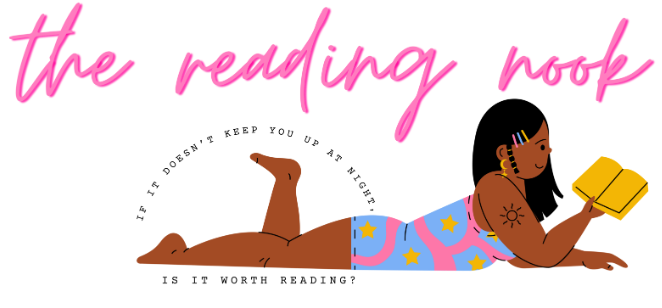



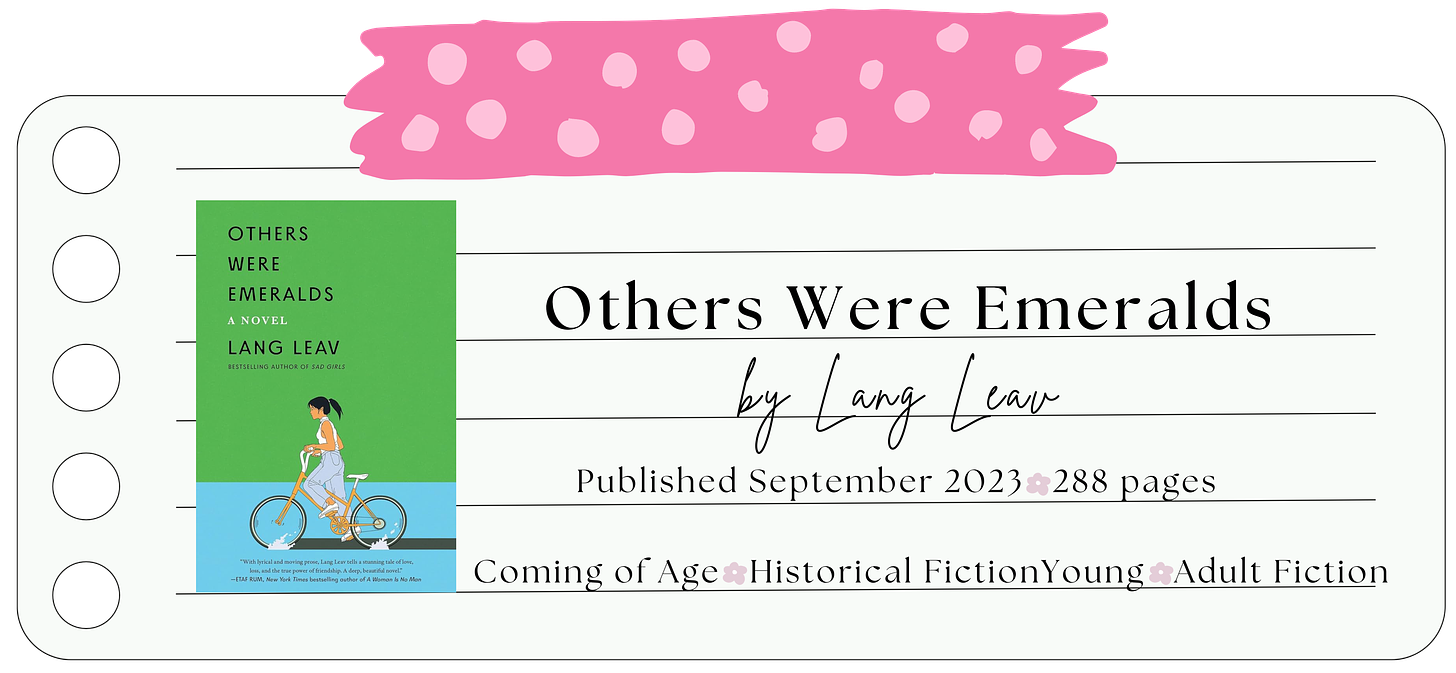
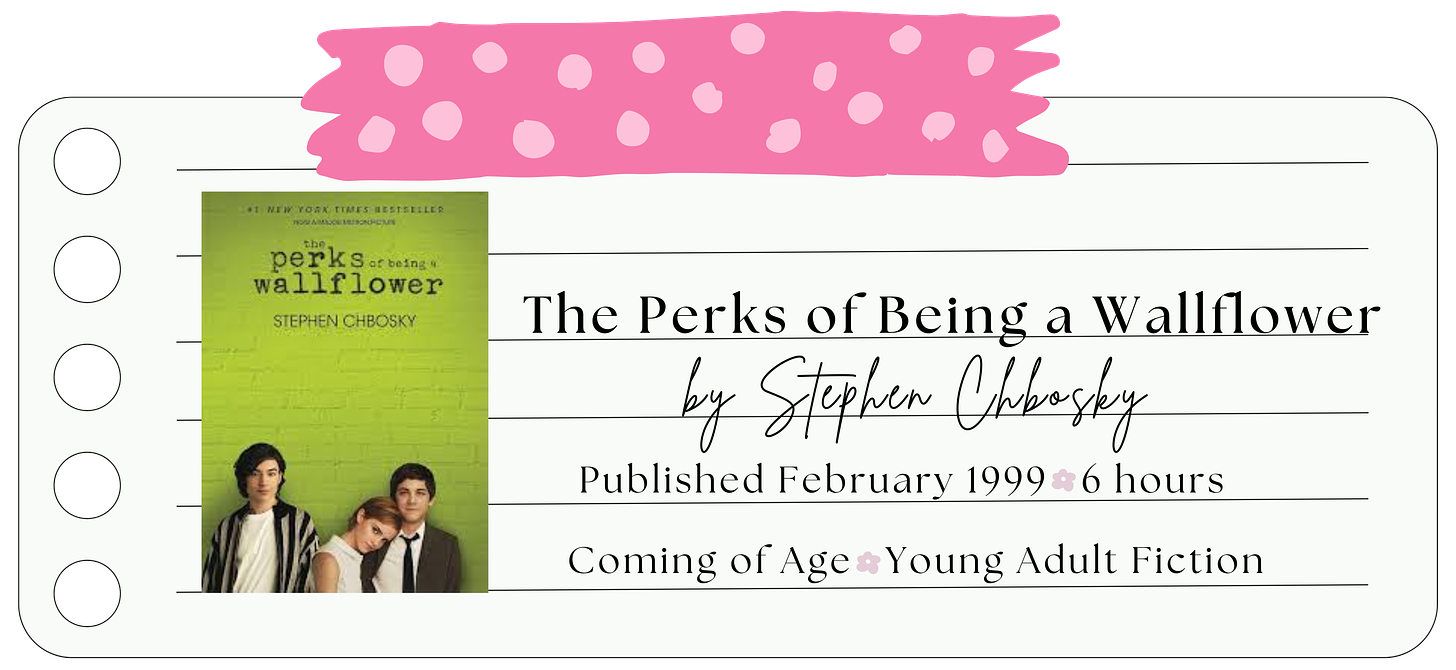
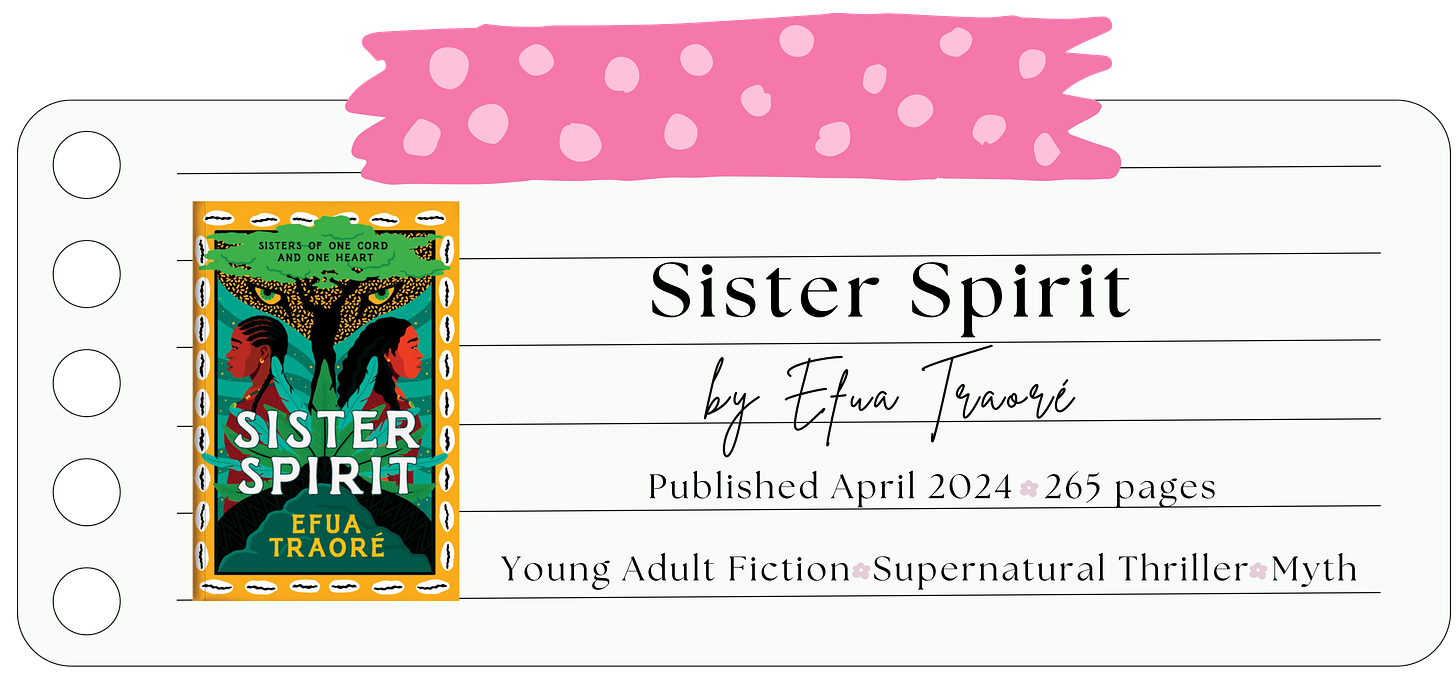
My reading slump has been BRUTAL as well 😢 normally an audiobook helps me out when I want to break out of the slump
I’ve realized that if I’m struggling to read a book, I just don’t like it that much. Because otherwise I actually finish books quickly.